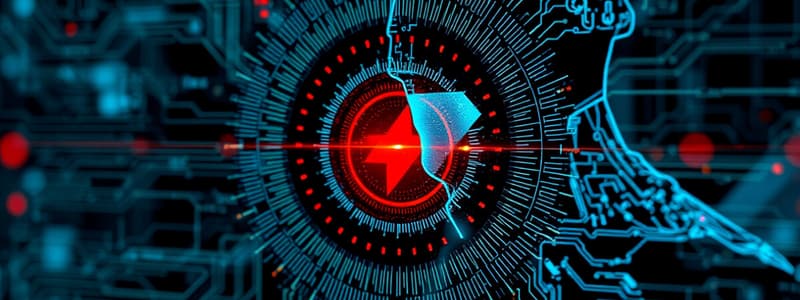Podcast
Questions and Answers
What is the primary purpose of cyber warfare?
What is the primary purpose of cyber warfare?
- To promote international cooperation through technology
- To enhance diplomatic relations between countries
- To protect national secrets through espionage only
- To disrupt the vital computer systems of another nation (correct)
Which capability does AI significantly enhance in cyber warfare?
Which capability does AI significantly enhance in cyber warfare?
- Performing traditional warfare tactics online
- Increased human oversight in cyber operations
- Threat detection and response capabilities (correct)
- Vulnerability assessment with manual input only
What is one of the key applications of AI in intrusion detection?
What is one of the key applications of AI in intrusion detection?
- Identifying unusual network patterns (correct)
- Analyzing stock market trends
- Monitoring employee morale
- Creating social media engagement strategies
How does AI help in malware detection?
How does AI help in malware detection?
Which of the following statements regarding AI and phishing detection is correct?
Which of the following statements regarding AI and phishing detection is correct?
What is a concern related to the ethical use of AI in cyber warfare?
What is a concern related to the ethical use of AI in cyber warfare?
What is one of the challenges faced by cyber warfare due to rapid technology evolution?
What is one of the challenges faced by cyber warfare due to rapid technology evolution?
What trend is expected in the integration of AI into military strategies?
What trend is expected in the integration of AI into military strategies?
What role does Natural Language Processing (NLP) play in cyber warfare?
What role does Natural Language Processing (NLP) play in cyber warfare?
Which description fits 'offensive cyber operations' utilizing AI?
Which description fits 'offensive cyber operations' utilizing AI?
Flashcards are hidden until you start studying
Study Notes
Cyber Warfare and AI
-
Definition of Cyber Warfare:
- Use of digital attacks by one nation to disrupt the vital computer systems of another.
- Incorporates espionage, sabotage, and information warfare.
-
Role of AI in Cyber Warfare:
- Enhances threat detection and response capabilities.
- Automates the process of identifying vulnerabilities in systems.
- Analyzes vast amounts of data to predict and counter cyber threats.
-
Key Applications of AI in Cyber Warfare:
- Intrusion Detection:
- AI algorithms monitor network traffic for unusual patterns indicative of cyber attacks.
- Malware Detection:
- Machine learning models identify and classify new malware variants faster than traditional methods.
- Phishing Detection:
- AI systems analyze emails and messages to flag potential phishing attempts based on patterns and user behavior.
- Intrusion Detection:
-
Offensive Cyber Operations:
- AI can be used to develop advanced malware that adapts to evade detection.
- Automated tools for launching coordinated cyber attacks against critical infrastructure.
-
Data Analysis and Intelligence Gathering:
- AI processes and analyzes intelligence data from various sources to identify targets and assess vulnerabilities.
- Natural Language Processing (NLP) can be used to analyze communication for planning attacks.
-
Ethical Considerations:
- Concerns about the potential for autonomous weapons systems to make life-and-death decisions.
- Risks of escalation in cyber conflicts due to AI-enabled offensive capabilities.
-
Challenges:
- The rapid evolution of technology outpacing regulatory frameworks and international norms.
- Difficulty in attributing cyber attacks to specific actors, complicating responses.
-
Future Trends:
- Increasing integration of AI into military cyber strategies.
- Development of AI-driven cyber defense systems to protect critical infrastructure.
- Growing emphasis on collaboration between governments and private sector for cybersecurity.
Cyber Warfare and AI
-
Cyber Warfare Defined:
- Digital attacks by nations to disrupt another's critical computer systems.
- Encompasses espionage, sabotage, and information warfare tactics.
-
AI's Role in Cyber Warfare:
- Improves threat detection and enhances response strategies.
- Automates vulnerability identification in cybersecurity systems.
- Analyzes large data sets for predictive analysis against cyber threats.
Key Applications of AI in Cyber Warfare
-
Intrusion Detection:
- AI algorithms effectively monitor network traffic for anomalies signaling potential cyber attacks.
-
Malware Detection:
- Machine learning accelerates the identification and classification of emerging malware variants.
-
Phishing Detection:
- AI systems scrutinize emails and messages, flagging suspicious communications based on established patterns and user behaviors.
-
Offensive Cyber Operations:
- AI aids in creating adaptive malware designed to evade cybersecurity measures.
- Automated tools facilitate synchronized cyber attacks targeting essential infrastructure.
-
Data Analysis and Intelligence Gathering:
- AI processes intelligence data from multiple sources for vulnerability assessment and target identification.
- Natural Language Processing (NLP) assists in analyzing communications relevant to attack planning.
Ethical Considerations
- Concerns exist over autonomous weapon systems making critical life-and-death decisions without human oversight.
- AI-enabled offensive capabilities may escalate cyber conflicts, leading to increased tensions.
Challenges
- Technology advances rapidly, often outstripping current regulatory frameworks and international laws.
- Attributing cyber attacks to specific nations or actors remains complex, complicating potential responses.
Future Trends
- Anticipated growth in the integration of AI within military cyber strategies.
- Development of AI-based defense systems to safeguard vital infrastructure.
- Increased collaboration between governments and the private sector for enhanced cybersecurity measures.
Studying That Suits You
Use AI to generate personalized quizzes and flashcards to suit your learning preferences.




